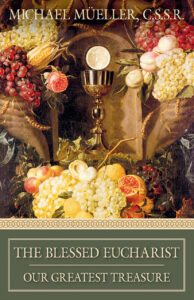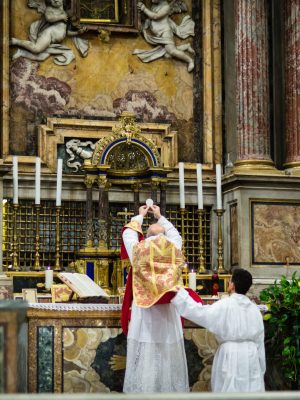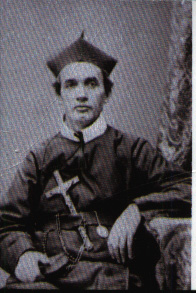If a good preparation before Communion is so important, a good thanksgiving after Communion is of even greater importance. St. John Chrysostom says that when a person has eaten some delicious food at a banquet, he is careful not to take anything bitter in his mouth immediately after, lest he should lose the sweet flavor of those delicate viands. In like manner, when we have received the precious Body of Jesus Christ, we should take care not to lose its heavenly flavor by turning too soon to the cares and business of the world.
St. Francis de Sales expresses the same idea. “When the merchants of India,” he says, “have brought home their precious porcelain, they are very careful in conveying it to their storehouses lest they should stumble and break their costly wares.
In like manner should the Christian, when he carries the priceless treasure of Our Lord’s Body, walk with great care and circumspection in order not to lose the costly gift committed to his keeping.” The meaning of both Saints is that after Communion we should spend some time in devout recollection and prayer. This is the general practice of good Catholics. And indeed, reason itself tells us that a good thanksgiving after Communion is of even more importance than a good preparation before it. If we are required to pause and consider what we are about to do when we approach Our Lord, what should be our devotion when He is actually in our hearts?
What a spectacle for the Angels, to see a creature approach that Sacred Host before which they bow in lowliest adoration and, when he has had the unutterable happiness of receiving his Redeemer, leave the church with as much unconcern as if he had but partaken of ordinary bread! If indeed this should be done by one who has had no opportunity for receiving instruction on this subject, no doubt the Angels will have compassion on his ignorance, but should a well-instructed Catholic be guilty of such ungrateful behavior towards Jesus Christ after Communion, I think that nothing but the mercy of Our Lord would prevent them from avenging the impiety.
Although the greatness of Our Lord is a sufficient reason why we should not leave Him alone in our hearts after Communion, it is not the argument which He Himself employs. There is in this Sacrament nothing that breathes of majesty. Our Lord is silent, whether we leave the church immediately or kneel and reverently converse with Him. The stones do not cry out against our ingratitude if, after eating the Bread of Angels, we do not give thanks to God. Jesus Christ might send twelve legions of angels to stand around us after we have left His table, to remind us that He is present in our hearts, but He does not do this.
Now it is from this very fact of not surrounding Himself with anything calculated to inspire fear that we ought to draw the most powerful incentive to gratitude. This Sacrament is a Sacrament of love. In it God is pleased to treat with His creatures in all familiarity. Jesus Christ, having accomplished the work of our Redemption, draws nigh to converse with us, as He did to the two disciples on their way to Emmaus. He wishes to speak with us as one friend speaks to another.
Oh then, what an affront it is to leave Him the moment that He comes to us! Scarcely to say one word to Him! Would you not consider it great unkindness if a loving friend had travelled far to see you, and when he has but a little time to stay, to leave him as soon as he had entered your house and go to attend to your business or to seek your pleasure? Would you not rather give him the best welcome you could and prepare the best room in your house and adorn it with your richest furniture; would you not sacrifice something of your time to keep him company and exchange some tokens of love before you allowed him to depart?
Now, should you not do as much for Jesus Christ, who has come so far to visit you, who has suffered so many sorrows for your sake, who is thinking of you always and has given you so many tokens of His love?
It is by this argument that Jesus Christ Himself prefers to incite us to make a due thanksgiving after Communion, and it is one which must have irresistible weight with every faithful heart.
This article is taken from a chapter in The Blessed Eucharist by Fr. Michael Mueller, which is available from TAN Books.









